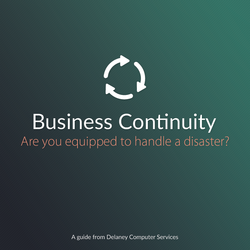Business Continuity: Are You Equipped To Handle A Disaster?

In the modern world, Business Continuity Planning is an essential tool for the sustainability of your business. Creating a thorough and efficient Business Continuity Plan (BCP) requires a well-thought-out plan of action that ultimately will protect your business if, and when, it confronts a disaster. A well designed BCP creates systems to prevent potential threats and provides specific steps to be used in the aftermath of a disaster in order to recover your business quickly and efficiently. Without a well-thought-out BCP, it is unlikely that your business will be able to completely recover, or in some cases, survive.
A Business Continuity Plan will provide you with the tools and steps your business will need in order to bounce back after any disaster - from a Cybersecurity breach to a national weather disaster and everything in between. However, there are some major roadblocks that can hinder the successful implementation of a BCP. Business Continuity Planning is a managed service offered by Delaney Computer Services. As such, we have decided to provide a few challenges faced while trying to implement a BCP and how to properly address them.
Challenge #1: Exorbitant Costs
Business Continuity Planning has become expensive. Frequently, solutions will require substantial investments on the installation and maintenance of hardware, software and data infrastructures. These additional requirements to a company’s IT budget drive up the cost of creating a successful and well-designed BCP. Given these facts, many company owners are hesitant to invest in these protective measures.
Solution: We need to make it more affordable for business owners to protect their data, their technology and their business itself. Instead of relying on physical servers and data infrastructures for your backups, consider switching to Cloud-based computing solutions. This easily eliminates need for maintenance on physical machines and even enhances ease-of-use. Now, you can send complete server and workstation backups directly to the cloud, eliminating the expense of installing and managing hardware infrastructures and software licenses.
Challenge #2: Complexity
As we have addressed, the implementation, management and execution of a well-designed Business Continuity Plan is complicated and sometimes daunting for a business owner. There are many steps to consider when creating a BCP, including managing backup/recovery infrastructure, updating documentation and testing to make sure your BCP is free of loopholes. The entire experience is time consuming and overwhelming, and to combine that with the pressure of day-to-day activities of your business, it can sometimes seem impossible to focus attention on this type of preventative effort.
Solution: In the modern threatscape, investing in preventative IT should be considered a cost of doing business. Break/Fix IT relationships do not save your data nor do they protect you from disasters. With this in mind, and if your business does not have the expertise to successfully design and manage a functional BCP, it probably makes more sense to hire a professional Managed Services Provider to implement, execute and maintain your BCP. This way, you can sleep easy knowing that your business will be ready if, and when, it comes face to face with a disaster. Delaney Computer Services can offer you a comprehensive managed service package to ensure your business will be able to bounce back, with all of your data, after anything from a hurricane to a Malware attack. Don’t roll the dice when it comes to preventive security for your business.
Challenge #3: Staff Involvement
In order to implement a successful BCP, you need to involve your staff. The more employees your company has, the more difficult it will be to communicate the plan for everyone to understand. Staff involvement cannot be an option as, in the wake of a breach or other disaster, you need everyone to pull their weight in order to successfully roll out your pre-designed BCP.
Solution: Educate your employees through training or meetings. Depending on the size of your company, either hold a company-wide training, or schedule a meeting with key employees, like managers or department heads, who can then educate the rest of the staff. Make sure to have employees take an active role in the planning process. In order to create a long-lasting BCP, you will need to ensure that everyone within your company understands the concept, the importance of the plan, and what their specific role will be in the wake of a disaster.
Business Continuity Planning is easily one of the most important measures your business should take in order to prevent unnecessary downtime, data and profit loss. If there is anything we should be learning in the modern world, it’s that you never know when, where, how, or in what form a disaster can strike. This is why we are such strong advocates for a preventative approach to IT. It’s not worth gambling away all you’ve worked for - it’s worth being prepared! If you need a reliable partner to take care of your Business Continuity Planning needs, give us a call today.
